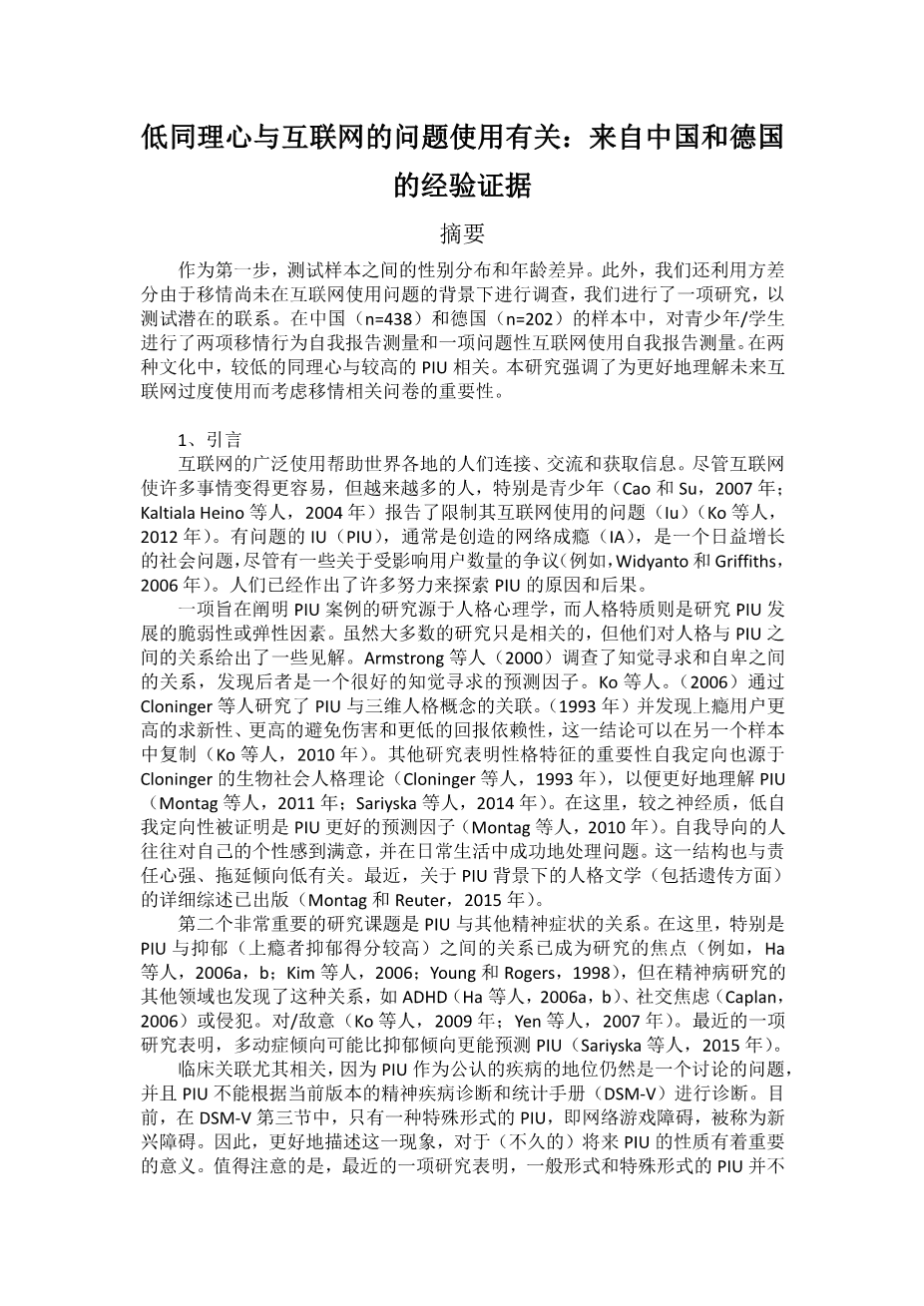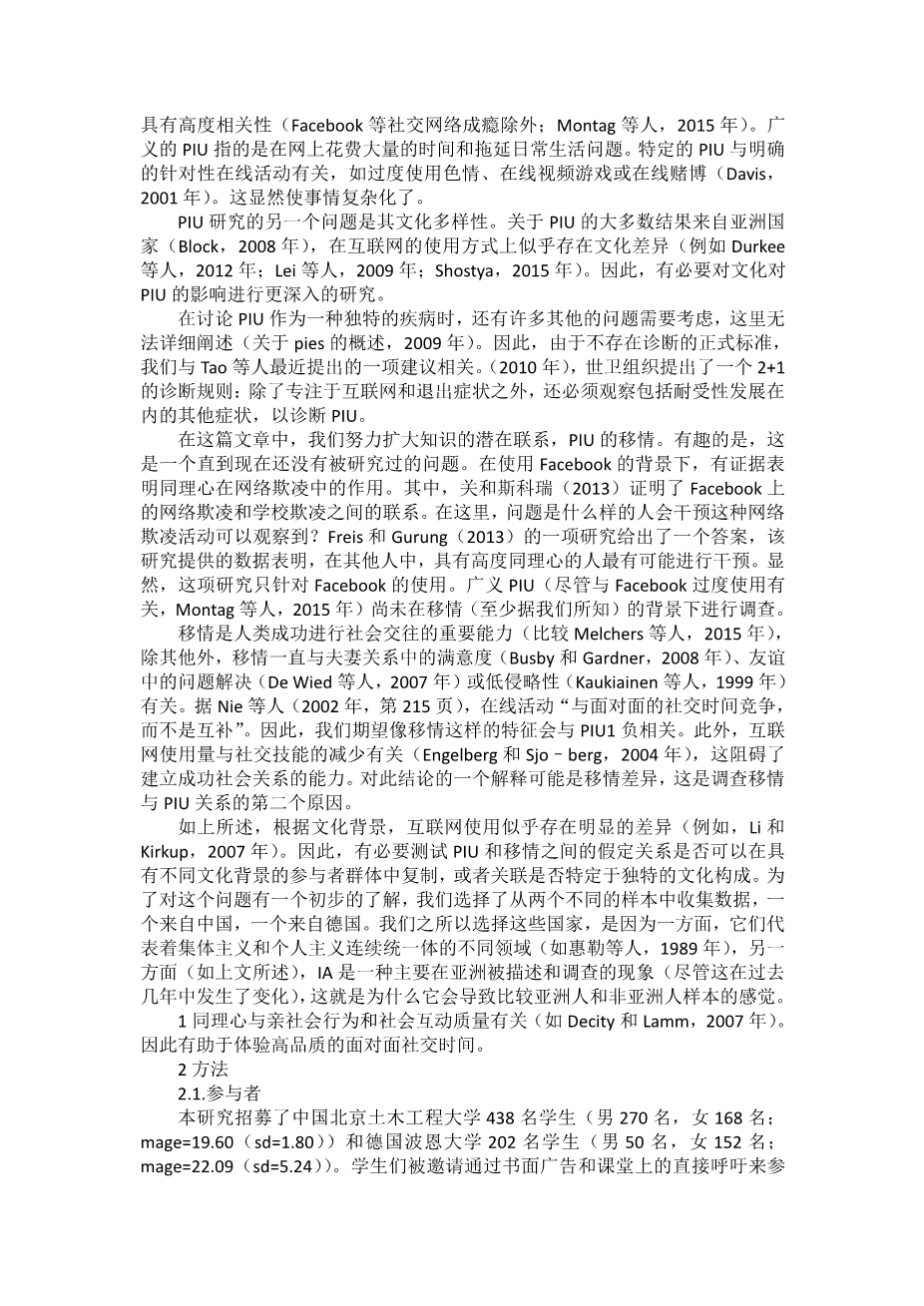Asian Journal of Psychiatry 17 (2015) 56–60
Contents lists available at ScienceDirect
Asian Journal of Psychiatry
jo u rn al h om epag e: ww w.els evier.c o m/lo cat e/ajp
Low empathy is associated with problematic use of the Internet: Empirical evidence from China and Germany
Martin Melchers a, Mei Li b, Yafei Chen b, Wanqi Zhang b, Christian Montag c,*
a Department of Psychology, University of Bonn, Bonn, Germany
b Student Counseling Center, Beijing University of Civil Engineering and Architecture, Beijing, China
c Institute of Psychology and Education, Ulm University, Ulm, Germany
A R T I C L E I N F O
Article history:
Received 5 December 2014
Received in revised form 13 May 2015 Accepted 22 June 2015
Keywords: Internet addiction Empathy
China Germany
A B S T R A C T
As empathy has not been investigated in the context of problematic use of the Internet, we conducted a study to test for a potential link. In samples from China (N = 438) and Germany (N = 202), two self-report measures for empathic behavior and one self-report measure for problematic Internet use (PIU) were administered in adolescents/students. Across both cultures lower empathy was associated with more PIU. The present study underlines the importance to take into account empathy related questionnaires for a better understanding of Internet overuse in the future.
© 2015 Elsevier B.V. All rights reserved.
The widespread use of the Internet helped people worldwide to connect, communicate and get information. Although the Internet made many things easier, a rising number of people, in particular adolescents (Cao and Su, 2007; Kaltiala-Heino et al., 2004), report problems in limiting their Internet use (IU) (Ko et al., 2012). Problematic IU (PIU), often coined Internet addiction (IA), is a growing problem in society, although there are some controversies concerning the amount of affected users (e.g., Widyanto and Griffiths, 2006). Many efforts have been made to explore causes and consequences of PIU.
One research endeavor to illuminate the case of PIU stems from personality psychology, whereas personality traits are investigated as vulnerability or resilience factors for the development of PIU. Although most studies are merely correlational, they give some insights into the relationship between personality and PIU. Armstrong et al. (2000) investigated the association of PIU to sensation seeking as well as low self-esteem and found the latter to be a good predictor for PIU. Ko et al. (2006) took a look at the association of PIU to the tridimensional personality concept by Cloninger et al. (1993) and found higher novelty seeking, higher harm avoidance, and lower reward dependence in addicted users, a finding which could be replicated in another sample (Ko et al., 2010). Other studies suggest the importance of the character trait
* Corresponding author. Tel.: 49 731 50 26550.
E-mail address: christian.montag@uni-ulm.de (C. Montag).
self-directedness stemming also from Cloninger’s biosocial theory of personality (Cloninger et al., 1993) for a better understanding of PIU (Montag et al., 2011; Sariyska et al., 2014). Here, low self- directedness has been shown to be a better predictor for PIU than neuroticism (Montag et al., 2010). Self-directed humans tend to be satisfied with their personality and handle issues in every day life successfully. This construct is also related to high conscientious- ness and low tendencies to procrastinate. A detailed overview on the personality literature (including genetic aspects) in the context of PIU has been published, recently (Montag and Reuter, 2015).
A second very important research topic concerns the relationship of PIU to (other) psychiatric symptoms. Here, especially the association between PIU and depression (higher scores in depression in addicted users) has become a research focus (e.g., Ha et al., 2006a,b; Kim et al., 2006; Young and Rogers, 1998), but relations were also found in other areas of psychiatric research, like ADHD (Ha et al., 2006a,b), social anxiety (Caplan, 2006) or aggression/hostility (Ko et al., 2009; Yen et al., 2007). A recent study provided evidence that ADHD tendencies might be even a better predictor for PIU than depressive tendencies (Sariyska et al., 2015).
The clinical associations are especially relevant, as the status of PIU as a recognized disorder is still a matter of discussion, and PIU cannot be diagnosed according to the current version of the Diagnostic and Statistical Manual of Mental Disorders (DSM-V). Right now, only a specific form of PIU, namely
剩余内容已隐藏,支付完成后下载完整资料


英语译文共 6 页,剩余内容已隐藏,支付完成后下载完整资料
资料编号:[423247],资料为PDF文档或Word文档,PDF文档可免费转换为Word


